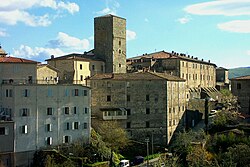Santa Fiora
| Santa Fiora | ||
|---|---|---|
| Comune | ||
| Comune di Santa Fiora | ||
 |
||
|
||
| Location of Santa Fiora in Italy | ||
| Coordinates: 42°50′N 11°36′E / 42.833°N 11.600°E | ||
| Country | Italy | |
| Region | Tuscany | |
| Province / Metropolitan city | Grosseto (GR) | |
| Frazioni | Bagnolo, Bagnore, Marroneto, Selva | |
| Government | ||
| • Mayor | Federico Balocchi | |
| Area | ||
| • Total | 62.9 km2 (24.3 sq mi) | |
| Elevation | 687 m (2,254 ft) | |
| Population (31 December 2014) | ||
| • Total | 2,640 | |
| • Density | 42/km2 (110/sq mi) | |
| Demonym(s) | Santafioresi | |
| Time zone | CET (UTC+1) | |
| • Summer (DST) | CEST (UTC+2) | |
| Postal code | 58037 | |
| Dialing code | 0564 | |
| Patron saint | Sts. Flore and Lucille | |
| Saint day | July 29 | |
| Website | Official website | |
Santa Fiora is a comune (municipality) in the Province of Grosseto, in the Italian region of Tuscany, located about 110 kilometres (68 miles) southeast of Florence and about 40 km (25 mi) east of Grosseto. Santa Fiora borders the following municipalities: Abbadia San Salvatore, Arcidosso, Castel del Piano, Castell'Azzara, Piancastagnaio, Roccalbegna, Semproniano.
Santa Fiora is mentioned for the first time in 890 AD, in a document listing properties of the Abbey of San Salvatore, Sforza Cesarini Archive Rome. By the eleventh century the lords of Santa Fiore were the Aldobrandeschi who, in 1082, started the construction of a castle here (Castello S. Flore) and walled the borgo. The power of the abbey passed by degrees to the Aldobrandeschi conti di San Fire, and in turn to the hegemony in Lower Tuscany of the commune of Siena, which was strong influence on Santa Fiora by the mid fourteenth century, a future already foreseen by Dante: "e vedrai Santafior com' è oscura", "and you shall see how obscure is Santa Fiore" (Purgatorio, canto VI, 111). In 1439, with the marriage of Cecilia Aldobrandeschi and Bosio Sforza, the castello and its town passed to the Sforza.
The Sforza of Santa Fiora reached their highest point of power with count Guido Sforza di Santa Fiora, who managed to establish himself as a relative of Pope Paul III Farnese, thereby gaining prestigious political positions for his relatives. Later the family became the Sforza Cesarini, who are still well represented and living in their Roman Palazzo Sforza Cesarini. The sovereign rights of the small state of Santa Fiora were sold to the Grand Duchy of Tuscany under Leopold II though all feudal rights remained to the family.
...
Wikipedia


